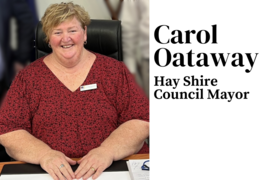Reform badly needed in superannuation law so abusers do not benefit
Kimberly Grabham
10 December 2024, 10:00 PM

The tragic death of Molly Wilkes, a 22-year-old victim of domestic violence, has exposed a critical flaw in Australia's superannuation system, leaving her family grappling with grief and a fight for justice.
Molly's story sheds light on the urgent need for reform to prevent perpetrators of abuse from profiting from their victims' superannuation death benefits.
Molly's story is sadly not unique. Relationships NSW reports that, on average, it takes seven attempts for a survivor to leave an abusive relationship.
Molly had tried six times to escape her abuser before her tragic death.
Under current superannuation laws, only spouses, children, or financial dependents are eligible to receive death benefits.
This rigid system allowed Molly's abusive husband, despite her prior nomination of her mother as beneficiary, to claim her superannuation, adding another layer of pain to an already unbearable loss.
This is yet another infuriating and damaging blow to the abused, another cog in the system which allows the abused to profit and come out on top.
Julie Adams OAM, Molly's mother, embarked on a tireless campaign to prevent this injustice, challenging the super fund and the Australian Financial Complaints Authority (AFCA).
Both entities expressed sympathy but were bound by the current legislation, which only allows for refusal of payment if the beneficiary is found guilty of murder, excluding even manslaughter convictions.
The fight for change extends beyond Molly's case.
Experts and advocates are calling for a comprehensive review of the superannuation death benefits system.
Alex Kelly, acting CEO of the Financial Rights Legal Centre, stresses the need to empower super funds to consider family violence in death benefit distribution decisions.
Legal experts believe that the superannuation industry is ready for reform.
Key proposed changes include:
Amending the law to allow funds to consider evidence of domestic violence and financial abuse when determining beneficiaries.
Empowering AFCA to consider domestic violence when assessing the fairness of a fund's decision.
Ensuring super funds follow best practices when supporting survivors.
It does not stop at cases such as Molly's.
Women have been denied access to their abusive partners' superannuation death benefits.
This injustice stems from a system that often fails to recognize the complex financial dynamics of abusive relationships, leaving survivors in precarious financial situations.
The sources highlight several cases where the system has failed to protect these women.
In one instance, a woman who endured 29 years of abuse was denied any portion of her deceased partner's superannuation.
Despite living apart at the time of his death, a decision attributed to his physical abuse, she was unable to prove financial dependence due to his control over their finances.
This case underlines how the system's reliance on traditional financial markers of dependence can disadvantage survivors who have experienced economic abuse.
Another woman faced a similar fate when her deceased de facto partner's superannuation was awarded to his parents, despite her claims of financial dependence.
She had left their shared home to protect her well-being from his "violent episodes," but this separation was used against her in the superannuation claim.
These cases demonstrate a distressing pattern of the system prioritizing technicalities over the realities of abusive relationships.
Experts argue that reforms are urgently needed to address this gap in the superannuation framework.
Definitions of a long term relationship created by government departments, or guidelines used to label them, are failing to see the nuances and methods of control an abuser can employ.
Sharing a lease with an abusive partner can be misinterpreted as a genuine long-term relationship, potentially granting the abuser access to the victim's superannuation upon death.
Super funds to consider a wider range of factors, including evidence of financial abuse, isolating behaviors, and testimonies from those close to the deceased.
Advocates call for a more holistic approach that considers the nuanced dynamics of domestic violence and financial abuse.
Super Consumers Australia, for instance, proposes amendments that allow funds to consider these factors when making decisions on death benefits.
Additionally, they urge for clarification on the role of the Australian Financial Complaints Authority (AFCA) in considering domestic violence when assessing the fairness of a fund's decision
While legal experts believe the superannuation industry supports these changes, they caution that clear legislation is crucial to guide funds in navigating these sensitive situations.
Ultimately, the current superannuation system risks perpetuating the harms of domestic violence even after death.
Conducting a comprehensive independent review of the death benefit system to ensure its effectiveness for all Australians.
Molly's legacy is a call to action.
It is a plea to lawmakers, superannuation funds, and the community to recognize the urgent need for reform.
By addressing these critical flaws, we can strive to ensure that superannuation benefits serve their intended purpose—to provide financial security—and not become a tool that further victimizes those who have already endured so much.
LOCAL WEATHER
VISIT BALRANALD
VISIT OUTBACK NSW
NEWS
SPORT
















